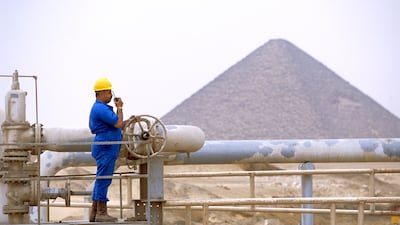Recently, Egypt and Turkey signed a significant natural gas and liquefied natural gas agreement to deploy a Turkish floating storage and regasification unit on Egyptian shores for the first time. The deal marks an important step in ensuring the security of Egypt’s natural gas supplies and offers clear evidence of its essential role in supporting industries, business and homes around the world.
Yet, while the economic benefits of gas and LNG expansion are incontestable, this landmark collaboration should be seen as a testament to the resource’s larger potential as a strategic instrument – one which enables cross-border co-operation and helps build bridges towards shared global progress.
For nearly 10 years now, natural gas has become increasingly indispensable to the stability and growth of countless economic systems, including in North Africa, Europe and Asia. Its unique combination of reliability, affordability and comparatively low carbon emissions have made it an ideal source of power for both developing and developed countries seeking to balance economic development with environmental responsibility. Today, natural gas and LNG are used to fuel vital sectors such as manufacturing, transportation and emerging technologies, and with demand forecasted to rise by 60 per cent by 2040, there is little doubt that they will continue to be a key part of our energy future.
Here in Egypt, leveraging the economic value of natural gas has long been a top priority. During my time as minister of petroleum and mineral resources, the country expanded investments in liquefaction plants, extraction and distribution infrastructure. The results speak for themselves: gas and LNG export revenues reached $8 billion in 2022, up from $0.6 billion in 2014.
Meanwhile, further investments in pipeline networks and terminal infrastructure have also unlocked domestic value far beyond the resource itself. In fact, natural gas now generates most of Egypt’s electricity, supplies affordable energy to millions of homes and powers a new generation of local enterprises. This reliable foundation has allowed Egypt to sustain growth, create jobs and even set ambitious climate targets.
However, as this most recent agreement with Turkey demonstrates, the power of natural gas extends far beyond its use as fuel for industries and homes, as it can often act as a vital platform for building international partnerships and unlocking new opportunities for mutual progress. At the very same meeting where the most recent gas deal was signed, senior government officials from Egypt and Turkey also agreed to wider collaborations to enhance the exchange of technical expertise and specialised knowledge to launch joint projects in strategic fields, including geothermal energy, hydrogen and vital minerals.
Such an outcome is not unique, as natural gas deals have often helped foster trust, deepen economic ties and create avenues for dialogue between nations. This was certainly the case just a few short years ago, when Israel, Egypt and the US came to a historic agreement to boost the EU’s supply of natural gas. A memorandum of understanding between the three players not only established a strong and mutually beneficial supply chain – where Israeli gas is liquefied in Egyptian plants before being sent by tanker to Europe – it also provided a new platform upon which our nation could revive strained relations with Israel and demonstrate strategic value to the EU.
These collaborations yield tangible benefits. Egypt’s strategic influence as a regional energy connector is fundamentally reinforced by partnerships with Cyprus, Israel and European partners, alongside active participation in the East Mediterranean Gas Forum, EGYPES and the world-renowned Gastech. These multilateral platforms enhance Egypt’s energy capabilities, attract foreign investment and accelerate technology exchange. For partner countries, reliable access to flexible energy supplies remains essential, and Egypt’s efforts to modernise and expand key infrastructure – coupled with supportive policies and a wealth of untapped resources – offer a secure and ascending market in which to do business.
But maintaining this ecosystem of co-operation takes work, especially when geopolitical developments and economic circumstances put pressure on all. For that reason, gatherings like Gastech 2025 – which will be hosted in Milan this year – are becoming increasingly critical to the health of the international ecosystem, and not just the growth and development of the energy industry. Convening ministers, industry leaders and experts from around the world, the event will offer a unique forum for the international community to align on the key challenges and opportunities that are shaping the global energy landscape. As it champions the role of natural gas in advancing shared energy goals, including security and sustainability of supply, Gastech’s line-up of top decisionmakers underscores the resource’s profound influence on the political, diplomatic and economic priorities of nearly every country.
The convergence of international partnerships, including the recent Egypt-Turkey agreement, and the convening power of global forums like Gastech illustrate how natural gas has evolved into a catalyst for collective progress. Its value now extends well beyond reliable supply and economic gain, serving as a foundation for trust, knowledge-sharing and cross-border innovation.
As countries navigate the challenges of energy security and sustainability, natural gas continues to offer a unique platform for building resilient alliances and advancing mutual interests. The future of energy will be shaped by those who recognise that shared prosperity is best achieved through collaboration – leveraging the strengths of natural gas to connect economies, encourage dialogue and support the transition to a more secure and low-carbon world.


